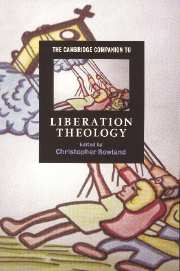Book contents
- Frontmatter
- Introduction
- Part one Contemporary liberation theology
- Part two Aspects of liberation theology
- Part three Analysis and criticism
- 8 Liberation theology and the Roman Catholic Church
- 9 Marxism, liberation theology and the way of negation
- 10 The economics of liberation theology
- 11 Political theology, tradition and modernity
- Epilogue: the future of liberation theology
- Select bibliography
- Index
10 - The economics of liberation theology
from Part three - Analysis and criticism
Published online by Cambridge University Press: 28 May 2006
- Frontmatter
- Introduction
- Part one Contemporary liberation theology
- Part two Aspects of liberation theology
- Part three Analysis and criticism
- 8 Liberation theology and the Roman Catholic Church
- 9 Marxism, liberation theology and the way of negation
- 10 The economics of liberation theology
- 11 Political theology, tradition and modernity
- Epilogue: the future of liberation theology
- Select bibliography
- Index
Summary
Introduction
Economics - in the general sense of the critical study of production, distribution and consumption of wealth in human society - is a central theme of liberation theology. Although liberation theologians do not address the technical questions that constitute modern economic theory, they are concerned with the broader issues of the way in which economic organisation relates to the historical experience of humanity in general and to the 'infinite value' of the poor to God in particular. These issues of economic organisation and social justice are similar to the agenda of European political economy until the end of the last century, and still central to debates on sustainable development strategies in poor countries. But a concern for life itself as the criterion for judging economic institutions can be considered to be a specific contribution from liberation theology. Further, this theology is probably unique in being located within the broader context of debates in poor countries on the origins of underdevelopment and the condition of poverty - mainly but not exclusively in Latin America - which themselves have a major economic dimension. In consequence, the 'economics of liberation theology' has had a considerable impact beyond church structures, ranging from grassroots social movements throughout the developing world to influential non-governmental organisations in industrialised countries.
- Type
- Chapter
- Information
- The Cambridge Companion to Liberation Theology , pp. 218 - 234Publisher: Cambridge University PressPrint publication year: 1999
- 4
- Cited by



